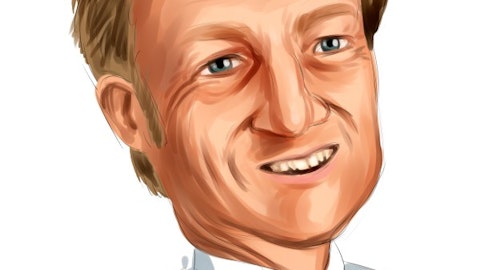
Other big name funds invested in Take-Two during 2Q were Ken Griffin – upping his stake 35% – and Jim Simons with a new position. See all the other funds pulling for Take-Two. The game maker’s signature brand is its Grand Theft Auto franchise. The release of the game’s fifth installment should drive revenue growth next year, expected to account for almost 50% of Take-Two’s revenue in 2013. Take-Two’s recent earnings saw a loss of $0.11 for 3Q, compared to a loss of $0.47 for 3Q 2011 and consensus estimates of a $0.18 loss.
Take-Two’s biggest competitors include Activision Blizzard, Inc. (NASDAQ:ATVI) and Electronic Arts Inc. (NYSE:EA). Activision key game line is its “Call of Duty” series. Activision’s most recent quarter saw revenues up 20% year over year thanks to new releases of in its World of Warcraft and Skylanders lines. Activision just launched its latest Call of Duty title, which should be a key driver for revenue growth to close the year. Activision is seeing a better mix of retail and digital content sales, with 3Q sales for digital up 11% year over year.
The fund interest was mixed for Activision in 2Q, where the top two funds, Arrowstreet Capital and AQR Capital downsized their positions. Other top names were increasing their positions though, including Steven Cohen and Ray Dalio with Bridgewater Associates. See for yourself.
EA recently saw a downgrade at S&P, from ‘sell’ to ‘strong sell,’ while a price target of $10 was placed on the stock. This comes on the back of 3Q EPS coming in at $0.15, compared to $0.05 for 3Q 2011, but below estimates of $0.18. Other pressures on the game company are its poorly received launch of Medal of Honor, and competitive pressures from rival launches of new Halo and Call of Duty games.
Two newcomers as shareholders in EA were Hayman Advisors (check out some of Hayman’s ideas from the IFK conference) and Mak Capital One during 2Q, both investing over 6% of their 13F portfolios in the game company. Two big name fund managers, Ken Griffin and Jim Simons, upped their 1Q stakes by 150% each.
The two largest game console and accessory companies that EA, Take-Two, and Activision rely on are Sony Corporation (NYSE:SNE) and Microsoft Corporation (NASDAQ:MSFT). Increased competition is putting pressure on the hardware and console companies to either release a next gen product or reduce prices. There has not been a new series of console, either by Microsoft (XBOX) or Sony (PlayStation), in the last seven years; the previous average turnover was around four years.
Of the two console companies, we like Microsoft’s long term prospects much better. Sony has seen poor performance from its various segments, in part due to boycotts by China of Japanese products. Due to various other competitive pressures, Sony has also seen slowdowns in TV and computer sales. Microsoft not only has a better performing product portfolio, but it is also the maker of the widely popular Halo games.
Sony saw the least interest out of all of our five companies listed here, with top share owner Ken Griffin selling off 25% of his already very small 1Q position. Microsoft on the other hand has some of the most robust interest of the five stocks. Jim Simons upped his 1Q stake almost 90% and the two top fund owners First Eagle Investment Management and Eagle Capital Management each owned over 20 million shares. Check out all the funds owning Microsoft.
As social gaming takes center stage, including notable online gaming company Zynga, many publishers are seeing a slowdown in game purchases, and are reducing production as a result. EA made 49 games in 2007, but will only release 19 games by the end of 2012. As part of combating the slowdown, Activision and EA are trying to gain recurring revenue from players of their popular military combat games through monthly subscription fees. Activision is doing this with its Call of Duty Elite service and EA plans to do the same with a premium service for its Battlefield franchise. Publishers also are focused on selling downloadable content for console and PC games. Take-Two took the lead in this arena by selling new downloadable episodes of its Grand Theft Auto series.
Activision trades the cheapest on a P/E basis at 16x, compared to Ubisoft’s 20x and the incalculable P/E ratios of Take-Two and EA. The video game industry still remains in limbo in our opinion. With the declining sale of game consoles and competition from online and mobile games, it is in desperate need of reinvigorating. The safest bet is Microsoft, which has a diverse product mix, and trades at 15x trailing earnings but only 8x forward earnings. Activision would be an interesting bet given its robust game mix and relative cheapness on a valuation basis, plus its strong expected growth, with a five-year expected earnings CAGR of 10%.




